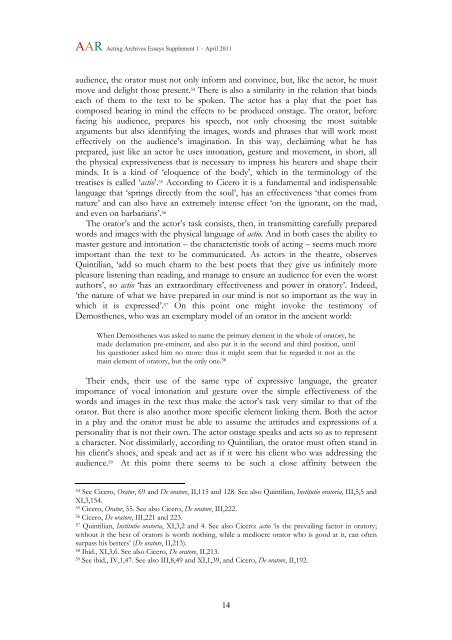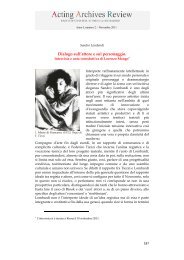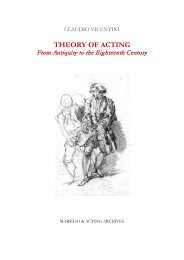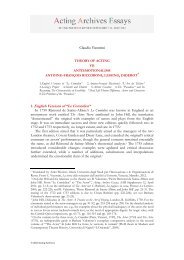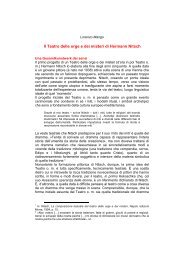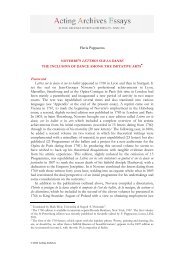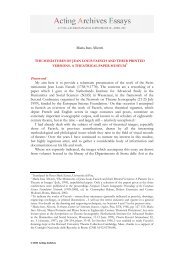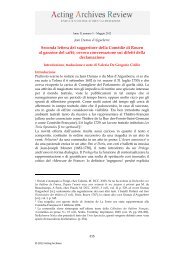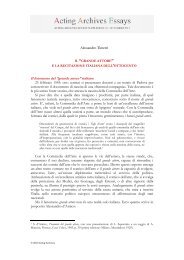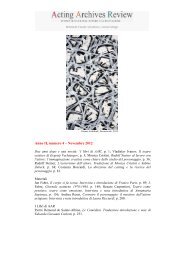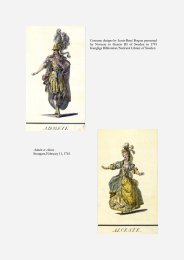Claudio Vicentini_Acting Theory in the Ancient World - Acting Archives
Claudio Vicentini_Acting Theory in the Ancient World - Acting Archives
Claudio Vicentini_Acting Theory in the Ancient World - Acting Archives
You also want an ePaper? Increase the reach of your titles
YUMPU automatically turns print PDFs into web optimized ePapers that Google loves.
AAR <strong>Act<strong>in</strong>g</strong> <strong>Archives</strong> Essays Supplement 1 – April 2011audience, <strong>the</strong> orator must not only <strong>in</strong>form and conv<strong>in</strong>ce, but, like <strong>the</strong> actor, he mustmove and delight those present. 54 There is also a similarity <strong>in</strong> <strong>the</strong> relation that b<strong>in</strong>dseach of <strong>the</strong>m to <strong>the</strong> text to be spoken. The actor has a play that <strong>the</strong> poet hascomposed bear<strong>in</strong>g <strong>in</strong> m<strong>in</strong>d <strong>the</strong> effects to be produced onstage. The orator, beforefac<strong>in</strong>g his audience, prepares his speech, not only choos<strong>in</strong>g <strong>the</strong> most suitablearguments but also identify<strong>in</strong>g <strong>the</strong> images, words and phrases that will work mosteffectively on <strong>the</strong> audience’s imag<strong>in</strong>ation. In this way, declaim<strong>in</strong>g what he hasprepared, just like an actor he uses <strong>in</strong>tonation, gesture and movement, <strong>in</strong> short, all<strong>the</strong> physical expressiveness that is necessary to impress his hearers and shape <strong>the</strong>irm<strong>in</strong>ds. It is a k<strong>in</strong>d of ‘eloquence of <strong>the</strong> body’, which <strong>in</strong> <strong>the</strong> term<strong>in</strong>ology of <strong>the</strong>treatises is called ‘actio’. 55 Accord<strong>in</strong>g to Cicero it is a fundamental and <strong>in</strong>dispensablelanguage that ‘spr<strong>in</strong>gs directly from <strong>the</strong> soul’, has an effectiveness ‘that comes fromnature’ and can also have an extremely <strong>in</strong>tense effect ‘on <strong>the</strong> ignorant, on <strong>the</strong> mad,and even on barbarians’. 56The orator’s and <strong>the</strong> actor’s task consists, <strong>the</strong>n, <strong>in</strong> transmitt<strong>in</strong>g carefully preparedwords and images with <strong>the</strong> physical language of actio. And <strong>in</strong> both cases <strong>the</strong> ability tomaster gesture and <strong>in</strong>tonation – <strong>the</strong> characteristic tools of act<strong>in</strong>g – seems much moreimportant than <strong>the</strong> text to be communicated. As actors <strong>in</strong> <strong>the</strong> <strong>the</strong>atre, observesQu<strong>in</strong>tilian, ‘add so much charm to <strong>the</strong> best poets that <strong>the</strong>y give us <strong>in</strong>f<strong>in</strong>itely morepleasure listen<strong>in</strong>g than read<strong>in</strong>g, and manage to ensure an audience for even <strong>the</strong> worstauthors’, so actio ‘has an extraord<strong>in</strong>ary effectiveness and power <strong>in</strong> oratory’. Indeed,‘<strong>the</strong> nature of what we have prepared <strong>in</strong> our m<strong>in</strong>d is not so important as <strong>the</strong> way <strong>in</strong>which it is expressed’. 57 On this po<strong>in</strong>t one might <strong>in</strong>voke <strong>the</strong> testimony ofDemos<strong>the</strong>nes, who was an exemplary model of an orator <strong>in</strong> <strong>the</strong> ancient world:When Demos<strong>the</strong>nes was asked to name <strong>the</strong> primary element <strong>in</strong> <strong>the</strong> whole of oratory, hemade declamation pre-em<strong>in</strong>ent, and also put it <strong>in</strong> <strong>the</strong> second and third position, untilhis questioner asked him no more: thus it might seem that he regarded it not as <strong>the</strong>ma<strong>in</strong> element of oratory, but <strong>the</strong> only one. 58Their ends, <strong>the</strong>ir use of <strong>the</strong> same type of expressive language, <strong>the</strong> greaterimportance of vocal <strong>in</strong>tonation and gesture over <strong>the</strong> simple effectiveness of <strong>the</strong>words and images <strong>in</strong> <strong>the</strong> text thus make <strong>the</strong> actor’s task very similar to that of <strong>the</strong>orator. But <strong>the</strong>re is also ano<strong>the</strong>r more specific element l<strong>in</strong>k<strong>in</strong>g <strong>the</strong>m. Both <strong>the</strong> actor<strong>in</strong> a play and <strong>the</strong> orator must be able to assume <strong>the</strong> attitudes and expressions of apersonality that is not <strong>the</strong>ir own. The actor onstage speaks and acts so as to representa character. Not dissimilarly, accord<strong>in</strong>g to Qu<strong>in</strong>tilian, <strong>the</strong> orator must often stand <strong>in</strong>his client’s shoes, and speak and act as if it were his client who was address<strong>in</strong>g <strong>the</strong>audience. 59 At this po<strong>in</strong>t <strong>the</strong>re seems to be such a close aff<strong>in</strong>ity between <strong>the</strong>54 See Cicero, Orator, 69 and De oratore, II,115 and 128. See also Qu<strong>in</strong>tilian, Institutio oratoria, III,5,5 andXI,3,154.55 Cicero, Orator, 55. See also Cicero, De oratore, III,222.56 Cicero, De oratore, III,221 and 223.57 Qu<strong>in</strong>tilian, Institutio oratoria, XI,3,2 and 4. See also Cicero: actio ‘is <strong>the</strong> prevail<strong>in</strong>g factor <strong>in</strong> oratory;without it <strong>the</strong> best of orators is worth noth<strong>in</strong>g, while a mediocre orator who is good at it, can oftensurpass his betters’ (De oratore, II,213).58 Ibid., XI,3,6. See also Cicero, De oratore, II,213.59 See ibid., IV,1,47. See also III,8,49 and XI,1,39, and Cicero, De oratore, II,192.14


